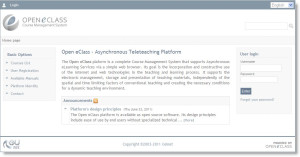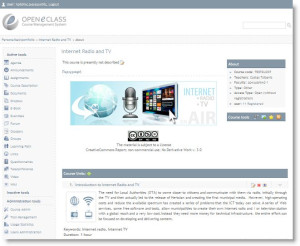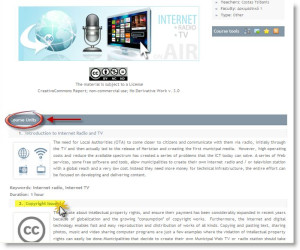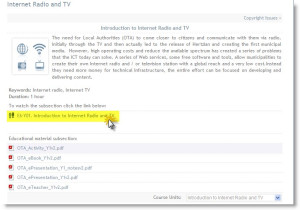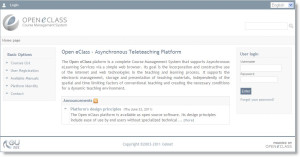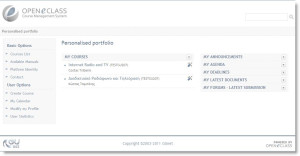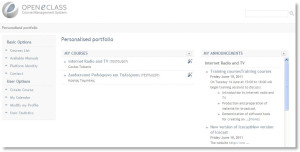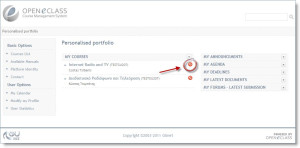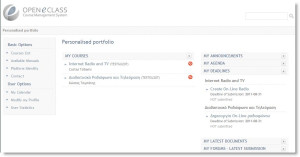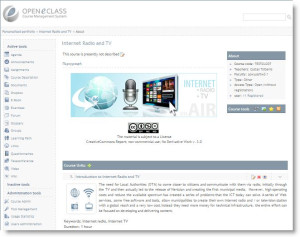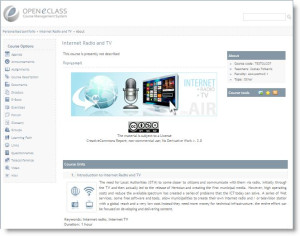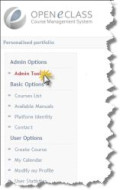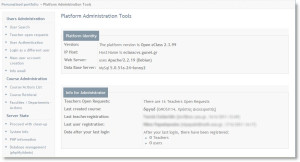Table of Contents
Platform Description
#;; Open eClass (ver.2.6) #;;
1. Introduction
The Open eClass platform is a complete Course Management System and it is the solution offered by the Greek Academic Network GUnet to support asynchronous eLearning services. It has been designed with the intention to support the conventional educational process. It is actively supported by GUnet and is distributed for free as open-source software.
The incorporation of asynchronous eLearning services offers new extensions in education, providing interaction and constant teacher-student communication. Also, the electronic organization, storing and presentation of educational material, is supported, forming the conditions of a dynamic educational environment. The user teacher can easily create practical and functional electronic courses, using the educational material provided (notes, presentations, texts, pictures, etc). Finally, the Open eClass platform supports all asynchronous eLearning services. The access to those services is achieved via a simple web browser without any demand of specialized technical knowledge.
2. Platform Philosophy
Open eClass is a mature open source e-learning platform. Its basic goal is to enhance and support educational activity, for both teachers and students, through a technological peak environment. The teacher is offered a dynamic knowledge feeding environment, while the student is offered an alternative channel of autonomous learning, which is independent of place and time limitations. Finally the administrator is offered an open, secure and trustworthy system.
Moreover, adaptability, multilingual support, flexibility, ease in usage, enhancement and upgrade capability, free distribution without the need of usage and maintenance license, small operational requirements, independence of the server’s Operating System, use of open models, incorporation with other network services, modular structure (user and course registration, access control, course creation, learning objects manipulation, administration, etc), as well as continuous technical support by GUnet, are the basic design principles for the Open eClass platform.
3. Goals - Benefits
The basic goal of the Open eClass platform is the development of a virtual educational environment, independently of the spatial and time limiting factors of conventional teaching. Particularly, the main goals that are achieved through the design of the platform and the benefits they enjoy by using it are:
- Incorporation of new informatics and telecommunication technologies in educational activities.
- Creation of a practical means of interaction and continuous communication between the teacher and the student.
- Exploitation of existing educational material and great educational experience.
- Constructive use of the Internet and the network infrastructure.
- Ease of teacher and student use for the support of people with different technical literacy and culture, still with the same high standards in the education provided.
- Provision of a low-cost, reliable, e-sight service for the asynchronous eLearning.
- Adaptability to special needs-requirements of the educational institutes.
- Ease at manipulation, upgrade and expansion.
- Free download and central support by the Greek Academic Network GUnet.
4. Basic Features
The basic platform features that compile its functional infrastructure are:
- distinct user roles
- distinct course categories
- structured course presentation
- easy course creation and use
- ease of administration
4.1 User Roles
The basic user-roles that platform Open eClass supports are three: a) user-teacher, b) user-student and c) platform administrator (there is a number of intermediate user roles like assistant admin, user admin, assistant teacher, user group leader, guest, etc).
The user teacher is responsible for the creation and administration of electronic courses. Teacher accounts are created by the platform administrators, on demand or after an on-line request. They can create an unlimited number of courses, contact student users registered to them, upload educational materials (texts, images, presentations, video, assignments, exercises, etc.), create discussion forums where course participants can interact and generally control the educational process
The user student can register to courses making an open registration, access educational materials, and participate in working groups, discussion forums and exercises. Student accounts can be created either automatically, by allowing open registration of new users, or by the platform administrators themselves after an on-line request.
Finally, the administrator has general control over the platform. Administrators can create and administer user accounts and courses, monitor the server and database operation.
4.2 eCourse Categories
The eCourse categories supported by the Open eClass platform are three: a) open courses, b) registration open courses, c) closed courses and d) inactive courses. The access pattern to an eCourse is defined by the teacher in charge during the creation of the course, while it can change dynamically through the interface of the eCourse administration tool. More analytically, the supported eCourse categories are the following:
Open courses are publicly accessible, even by visitors without a user account.
Registration required restricted courses are accessible to platform users that are registered to them. This means that these courses are open to everyone having an account. For additional security the course teacher can set a registration password.
Closed courses are only accessible to users after a course teacher allows access to their account by registering them to the course.
Finally, inactive courses are only accessible by the course teacher and they are not presented in any Course List.
4.3 eCourse Structure
The eCourse is the core part of the Open eClass platform. Each eCourse in the platform is an autonomous entity which integrates a number of learning tools (modules). The eCourse is in fact a modular structure organised and manipulated by the teacher in charge, according to the invested educational material and the eLearning model it will adopt (from a simple informative webpage to a totally dynamic educational environment).
On the eCourse home screen, there is a short description about the course, and the Course identity info with basic information (eCourse title, code, teachers in charge, department etc). Also, there is a toolbar with a) an “email” hyperlink, which allows registered student-users, who have defined their email address in their profile, to communicate with the course teacher via email, b) for the course teacher there is a useful “change role” link which allows him to easily examine the eCourse from the student view, c) a tool helping students and teachers to add eCourse homepage in the browser's bookmarks and d) a link to course announcements RSS feed. Finally, on the left, there is a tool menu with all 17 eCourse modules provided by the platform and 4 administrative tools for the course and users management.
The eCourse, as we already mentioned, is a modular infrastructure consisting of seventeen (17) learning modules (tools) and four (4) course management tools. The responsible teacher can activate and deactivate them according to the structure and the educational material of each course, so as to simplify the user environment, and allow appearance of the necessary educational units solely. More analytically, the supported elearning modules, which constitute the eCourse structure in the Open eClass platform, are the following:
- An agenda in which basic course events (lectures, meetings, evaluations, etc) are presented in a chronological order.
- Documents, in which the course material is stored, organized and presented. More precisely, this module provides a practical mechanism for managing, organizing and banding educational documents (texts, presentations, pictures, diagrams, etc) through a folder and sub-folder system.
- Announcements which are about the course and inform the registered users.
- Forums for exchange of opinions and ideas on issues about the course. It is a module of interaction between the teacher and the student.
- User Groups (open or closed) are a selection of registered users (students and teachers) who share the same conversation forum as well as the file and assignment submission area, and promote cooperation and interaction among students.
- Links, useful Internet resources concerning the course, grouped together.
- Assignments, a useful tool allowing the electronic management, submission and evaluation of a course assignment.
- Self-evaluation exercises created by the teacher aiming at students’ practice on the course material. This module consolidates a multiple choice exercise generator, as well as gap filling and matching exercises.
- Course Description, an area in which information on the course material is presented, as well as its goals, educational activities, evaluation methods, etc.
- Glossary, space for adding and managing the terms contained in the course.
- E-Book, a module for uploading and presenting electronic books in HTML format
- Multimedia, an area used for the storage and presentation of audiovisual educational material. There are two choices: adding a multimedia file or adding an external link to a multimedia recourse which is stored in a course relative Video On Demand (VOD) Server or in YouTube, etc
- Learning Path allows teachers to organise their educational material and students to follow a series of steps as learning activities. (SCORM)
- Wiki, a system for course participants to collaborate on documents, allowing everyone to edit document pages while maintaining full history of changes
- Teleconference is a module which allows teacher and students to exchange text messages (chat module)
- Questionnaires are a module which offers the capability of creating gallop polls and student profile surveys.
- Drop box area, where feedback in educational action is supported with the exchange of files between the teachers in charge and the course registered students.
The active learning modules of the course are enlightened on top of the eCourse left menu, and are seen by the students. The inactive learning modules are presented in wan light and cannot be viewed by the students. What is worth mentioning is the fact that the inactive course elearning modules remain functional, storing the information that may have been imported. They are just not viewed by the students.
Finally, the eCourse Management Tools allow teachers to configure course information (title, keywords, etc.), control eCourse access settings, renew or delete the eCourse, manage registered users, view usage statistics and activate / deactivate eCourse learning tools.
4.3.1 eCourse Units
Course units offer a flexible way to organize educational material that is stored in the course learning modules in an articulate structure.
More specifically, teachers can organize their courses structure based on the existing educational material in a way that follows the real life educational process. Course unit contents are accessible through the course homepage by clicking on its title. The student can click on the name of the module that wishes to enter the contents. The picture bellow shows the contents of the module we chose.
4.4 User Interface
The platform User Interface has been redesigned with the intention of becoming more functional and attaining consistency. The platform’s User Interface (basic screens) is briefly described below. More information can be found in teacher’s, student’s and administrator’s manuals.
4.4.1 Platform’s Homepage
The platform’s homepage includes the course list, the user registration forms, the user manuals, the platform identity with useful statistics on the platform use, as well as contact information with the platform administrators.
At the same time, there is a user login form for entering eCourses, as well as a link to remind users of their registration password.
4.4.2 User’s Portfolio
On entering the Open eClass platform, registered users are transferred to their personal portfolio, which is an area allowing them to organize and control their participation in the platform eCourses. There are two different portfolio views, simple or personalised, for both registered teachers and students.
In the left column menu there is a series of choices concerning the creation of the course, the registration to platform eCourses, the user’s profile maintenance, the eCourse management, the calendar, the platform’s identity, user manuals, and a link to the platform’s Administration Area.
In the central (main) column there is a list of supported courses (teacher-user) and a list of courses attended (student-user). If you click on the course title you enter the eCourse with the user’s rights depending of your role in the course. Also there is a “unregister” choice in the courses you attend as a student, so that you can delete it from the list. In the personalised portfolio there are five informative tools: a) my last announcements, b) my deadlines c) my last documents, d) my agenda and e) the last posts in the forums
4.4.3 Platform’s eCourse
The eCourse is the basic learning entity in the Open eClass platform. Each eCourse integrates a series of learning modules, which are organized and manipulated by the responsible teacher. More specifically, the eCourse home page depends on the course role (student or teacher) and is presented in the pictures that follow.
)
4.4.4 Platform Administration Area
Finally, the platform Administration area includes a number of administration tools for the registered users, the platform eCourses, the Server, the Database, as well as a series of supportive tools. In this area only platform Administrators have access.
5. Platform Support
The Open eClass platform (www.openeclass.org) is a complete Course Management System. It is distributed for free as open-source software. The platform is actively supported by the GUnet Asynchronous eLearning Group. Every platform installation is supported by the local administrators who are responsible for the platform’s operation, as well as the service of registered users’ (teachers, students) requests.
